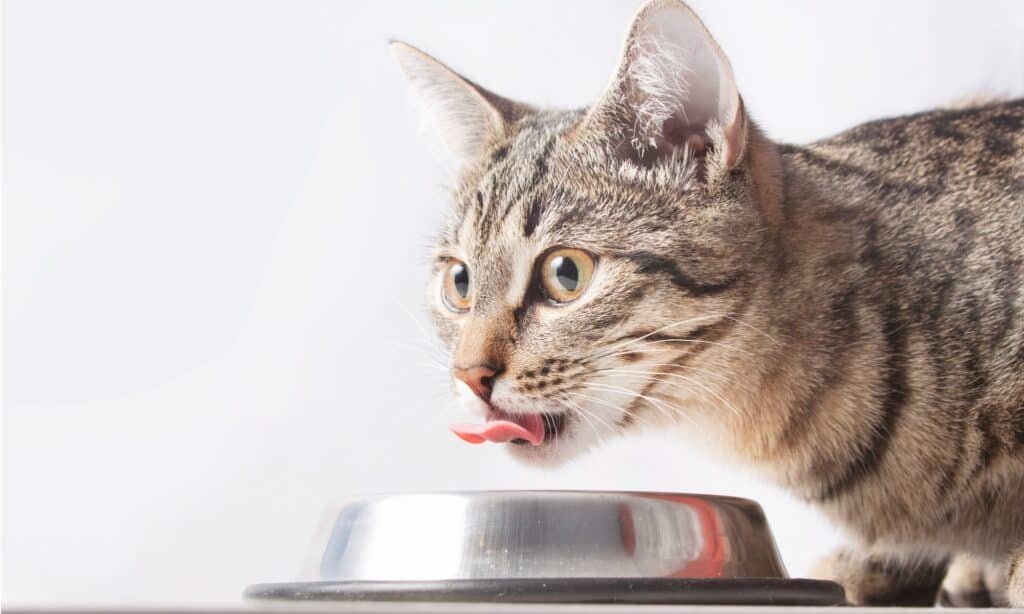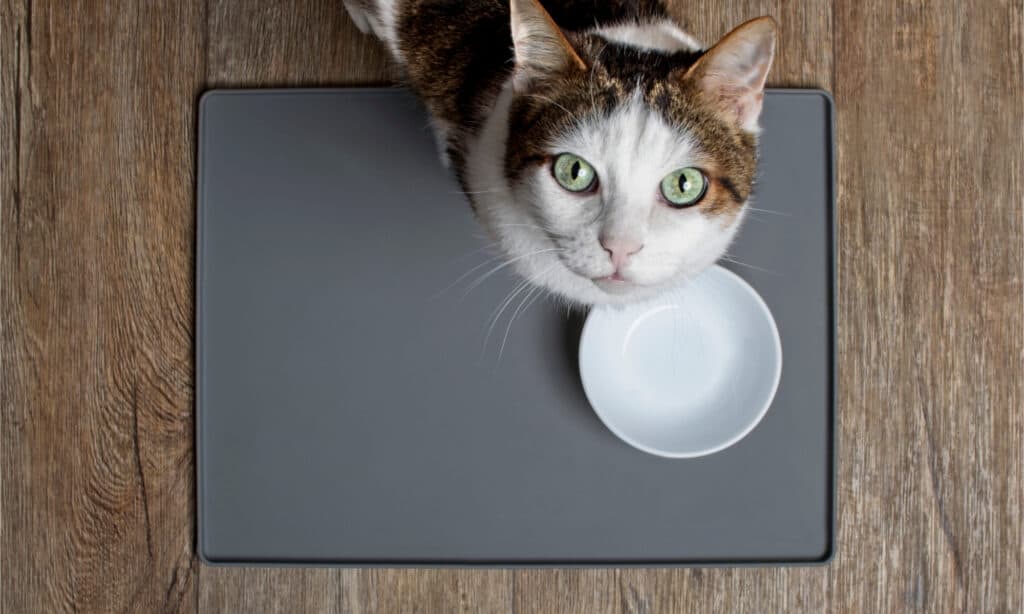There’s nothing more enticing than the smell of sizzling bacon in the morning. The scent of bacon through the halls will have everyone running to the breakfast table, our feline friends included! But is bacon safe for cats to eat?
While cats can technically eat bacon, there are a few safety tips you should be aware of before ever offering this tasty meat snack to your little one. Let’s break down the details below!
Is Bacon Safe For Cats To Eat?

Cats are obligate carnivores, so they need protein from animal tissues to live healthy lives.
©iStock.com/Ukususha
Our feline family members are obligate carnivores. Their bodies are designed to eat meat and source nutrients from animal tissues, so bacon is technically safe for cats to eat. However, though a cat can eat and digest bacon without issue, bacon is known for being incredibly high in sodium and fat. For this reason, bacon should only be offered to cats in small servings and as an occasional treat.
How Much Bacon Can Cats Eat Safely?
A cats daily treat allowance should make up no more than 10% of their daily caloric intake. Not only will you need to keep this in mind when offering your cat a bite of bacon, but you will also need to account for the fact that bacon is high in sodium and fat. A single slice of bacon can have up to 5 grams of fat, and this is way too much for our feline family members.
We suggest offering your cat no more than one small bite of bacon to stay within their treat allowance and prevent GI upset from the sodium and fat content. You should not offer them bacon more than once a week, as giving it any more can lead to weight gain and an increased risk of weight related complications.
Veterinarian Amy Nicole Lewis states that, “Offering bacon as a frequent snack can increase your cat’s likelihood of weight gain, putting them at risk of serious medical conditions like diabetes and pancreatitis. Cat treats are a much safer option for frequent rewards.”
The Potential Dangers Of Bacon For Cats

You should never offer your cat any bacon that is coated in garlic, onion, paprika, or other seasonings that can be harmful to cats.
©Lightspruch/Shutterstock.com
Cats can have a bite of bacon on occasion, but there are a few dangers of bacon consumption that you should be aware of. From common bacon seasonings to high amounts of fat, let’s break it down.
Seasonings and dressings: Bacon is commonly coated in seasonings that can be dangerous for cats when ingested. This can include garlic, onion, paprika, honey, BBQ, and more. You should only offer your cat a bite of bacon that is free of any seasonings.
High fat content: Not only does bacon have a high fat content, but it is often cooked in oils and butter. These types of fat can be difficult for a cat to digest properly, and it can increase their risk of developing GI upset or pancreatitis. We do not suggest giving your cat any bacon that is cooked in fatty oils or butter.
Bacteria in raw bacon: It’s important to make sure your cat does not have access to raw bacon when you are preparing it. Ingesting raw bacon can expose them to harmful bacteria that causes severe GI upset.
Can Cats Have Turkey Bacon?
Turkey bacon is slightly better for cats due to containing less fat, but it should still only be offered as an occasional treat. Just be sure that the turkey bacon is not cooked in any butter or fatty oils, and that it does not contain any harmful seasonings that can make your cat sick.
Can Cats Have Thick Cut Bacon?
Cats can have a small bite of thick cut bacon as long as it is fully cooked, free of any harmful seasonings, and free of any fatty butter or oils. While thick cut bacon does tend to be less greasy than standard bacon, you should still only offer your cat a small serving as an occasional treat.
Can Cats Have Canadian Bacon?
Cats can eat small servings of Canadian bacon on occasion. Canadian bacon is typically lower in fat and higher in protein than standard bacon, but it can still cause an upset stomach in cats if they eat too much of it. Be sure to offer your cat no more than a small bite of Canadian bacon if you would like them to enjoy a piece.
My Cat Is Sick From Eating Bacon – What Should I Do?
Some cats will develop an upset stomach after eating bacon due to its high sodium and fat content, even if they are only offered a small serving. Many cats will experience mild GI upset that will resolve on its won within 12-24 hours, but some cats will develop illness that requires a trip to the vet.
Some of the most common symptoms of an upset stomach after eating bacon include:
- Vomiting
- Diarrhea
- Lethargy
- Abdominal pain
- Decreased appetite
We always suggest taking your cat to the vet if they are experiencing the above symptoms for more than 24 hours. This could be a sign of a severe case of GI upset, or even a painful condition known as pancreatitis that can develop after eating fatty food.
Final Thoughts On Bacon For Cats
Bacon should only be offered to your cat in small servings and as an occasional treat. Be sure to review the information above on how to safely give your cat bacon, and you can better prevent GI upset in your little one!
The photo featured at the top of this post is © iStock.com/Lightspruch
Thank you for reading! Have some feedback for us? Contact the AZ Animals editorial team.







